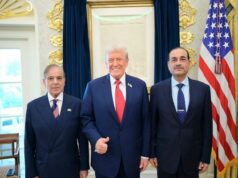NEW DELHI: The timing of Pakistani Foreign Minister Shah Mehmood Qureshi’s Strategic Dialogue with his Chinese counterpart Wang Yi is “very significant” coming on the “heels of the very consequential spat between Pakistan and Saudi Arabia,” says Michael Kugelman, Deputy Director, Asia Programme at The Wilson Centre in Washington, D.C. Speaking to StratNews Global Associate Editor Amitabh P. Revi on reports that Beijing stepped in to help Islamabad make an early repayment of $1 billion of a $3 billion Saudi loan and the likelihood of more financial aid, he says “China does not provide support to Pakistan as an act of charity,” adding “there have been times in the past, when senior Pakistani leaders have gone to China to request financial support and have been turned down.”
The South Asia Senior Associate also sees significance in the joint statement on the China-Pakistan Economic Corridor (CPEC) as a key component of the Belt and Road Initiative (BRI) as Beijing “telegraphs the BRI is very much sustainable and is going to succeed.” India has responded with the Ministry of External Affairs (MEA) Spokesperson Anurag Srivastava issuing a statement on” repeatedly conveying concerns to both China and to Pakistan on the projects in the so called CPEC, in territory illegally occupied by Pakistan,” resolutely opposing “actions by other countries that change the status quo in Pakistan occupied Jammu and Kashmir” and calling “on the parties concerned to cease such actions”.
Kugelman is also “struck” by the irony of the China-Pakistan communique breaking Islamabad’s public “radio silence” in “complete support for China” on the Uyghur issue, even as the spat with the Saudis was over Jammu and Kashmir. An August 22 MEA statement has reiterated India’s rejection of the “reference to J&K” in the China-Pakistan Press Release saying, “we expect the parties concerned not to interfere in matters that are internal affairs of India”. Pakistan is going to have to rethink its J&K strategy because it seems to have had limited global success other than getting significant support from China and some positive words from Turkey, Iran and Malaysia, notes Kugelman.
The 'Eye' of the story not the 'I' of the story. That's Amitabh Pashupati Revi's credo from the beginning of his professional journey in 1995. From conflicts in the war zones of Afghanistan, Syria, and Iraq to nuances of international politics in the Maldives,Thailand, and South Sudan, Amitabh has reported from all the world's continents, except for Antarctica(so far). Though, he has documented the world's third pole, the Siachen Glacier!
Amitabh reports and produces documentaries on the two-front China-Pakistan threat to India. His ground reports from Arunachal Pradesh and Ladakh have received viewership in the hundreds of thousands. Amitabh has interviewed world leaders, top global analysts, and experts in India, Russia, the United States, and Australia as well. Along the way, he’s picked up the Russian language, the Ramnath Goenka Award for his reporting on the 'Islamic State' terrorist group in Iraq, the Khaled Alkhateb Award for his reporting from Palmyra, Syria, and the UN Dag Hammarskjöld Distinguished Journalist Fellowship. Last but not least, as a founder member of StratNews Global, Amitabh helps lead the reporting, editorial, production, and administration teams at StratNews Global, BharatShakti, and InterStellar on their journey ahead.




